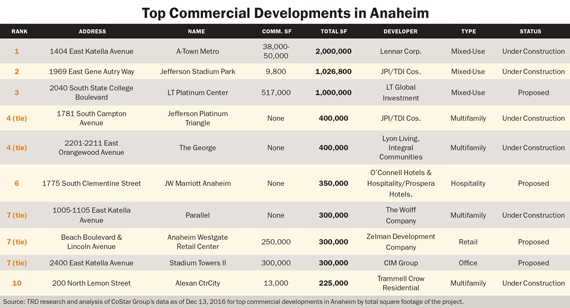 It’s not all about the Mouse Ears in Anaheim. The constant expansion in and around Disneyland notwithstanding, there is plenty of development in the works — both in the city’s former industrial base, known as the Platinum Triangle, and in its long-neglected historic downtown, now dubbed CtrCity.
It’s not all about the Mouse Ears in Anaheim. The constant expansion in and around Disneyland notwithstanding, there is plenty of development in the works — both in the city’s former industrial base, known as the Platinum Triangle, and in its long-neglected historic downtown, now dubbed CtrCity.
The building boom stems from a 2004 rezoning of the area to allow for increased density and more residential development. Experts say that while the rezoning went into effect immediately, the 2008 financial crisis substantially delayed the impact because Anaheim was slow to recover.
The Platinum Triangle is a sprawling 820-acre area to the east of the Disneyland Resort, located between the Santa Ana River and Interstate 5. City planners hope to transform this sparsely populated low-rise commercial corridor into a dense, urban setting with multifamily housing and mixed-use projects. Currently, Platinum Triangle projects worth $4.5 billion are under construction, according to city spokesperson Mike Lyster.
The rezoning also prompted developers to invest in CtrCity, which is located about one mile north. More than 2,000 townhomes, condos and apartments were added in the past decade to CtrCity, where the population has increased by 50,000. Over 4 million square feet of multifamily homes is currently under development, according to CoStar.
“Disney drew economic activity away from the historic downtown, causing it to wither on the vine,” John Woodhead, the executive director of community and economic development for the City of Anaheim, said of CtrCity’s past. “We had some urban blight, frankly.” He added that the response may have been extreme. In 1973, the city bulldozed vacant buildings over some 100 acres of the downtown that had fallen into disrepair, losing a large number of Anaheim’s historic structures in the process.
“We have been repenting ever since,” said Woodhead. “We wanted to repopulate our downtown after we essentially leveled it overnight, and it took a long time. There were a lot of empty lots.”
As usual, development continues at a red-hot pace in and around Disney, which has had an outsized impact on the city since the theme park opened in 1955. Already the city’s largest employer, Disney is adding a $1.5 billion “Star Wars”-themed land, which will include a nearly 7,000-space parking structure, transit hub and pedestrian bridge to the theme parks. Two luxury hotels are in the works nearby: the 466-room JW Marriott Anaheim in the GardenWalk mall, and an as-yet-unnamed 580-room luxury hotel located directly across the street from the park.
Located a stone’s throw from Disneyland, the Anaheim Convention Center complex, including hotels, sits on over 1,100 acres. A $190 million, 200,000-square-foot expansion has been proposed. Plans include flexible meeting space with a 10,000-square-foot balcony overlooking Katella Avenue, the theme parks and Disneyland Resort fireworks.
“We are seeing an unprecedented level of investment in Anaheim,” said Lyster. “It’s a direct result of efforts we have made to encourage investment as well as Anaheim’s enduring appeal as a place for people the world over to visit.”
The City of Anaheim owns Angel Stadium and the Honda Center, which both lie within the Platinum Triangle, and planners would like to redevelop the 130 acres of asphalt surrounding the stadium.
“We see a lot of opportunity around the stadium to create the kind of experience you see in Downtown Los Angeles with Staples Center,” Lyster said.
As for CtrCity, Lyster points to the positive effect on the area of redevelopment projects like the one at the former Sunkist canning factory, a 12,600-square-foot, Mission-style building built in 1919 that escaped the bulldozers. Developer Shaheen Sadeghi of LAB Holdings transformed it into a communal food hall with 28 food vendors. Known as the Packing House, it opened in 2014. It was designed to recall the nostalgia of Anaheim’s bygone downtown, with salvaged objects from demolished historic buildings.
“What we’ve seen in CtrCity is a lovely set of amenities that make development around it more attractive,” said Woodhead, “For a long time, visitors have asked what authentic things there are in Anaheim. Until recently, we haven’t been able to point to something unique.”
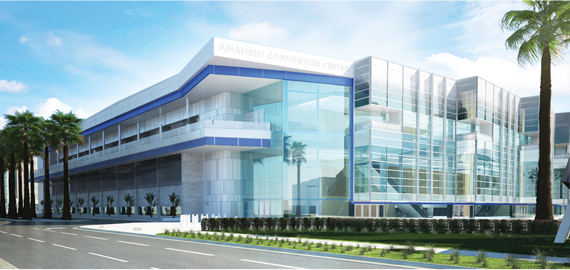
Anaheim Convention Center
Anaheim Convention Center
Work has begun on the seventh expansion of the 1.6 million-square-foot Anaheim Convention Center since its opening in 1967. Local politicians and planners say the work will add 200,000 square feet of much-needed flexible meeting space, which should help the city compete with rival West Coast convention centers in Los Angeles, San Diego and San Francisco. Plans include a 10,000-square-foot balcony overlooking Katella Avenue as well as a new 1,350-space parking structure. “The project is long overdue,” City Council member Lucille Kring told the Orange County Register. Located at 800 West Katella Avenue, the new building will have a curvilinear glass design that will allow the complex to serve an additional 250,000 visitors annually. The city funded the $190 million project with a 2014 bond offering. Turner Construction Company was awarded the project.
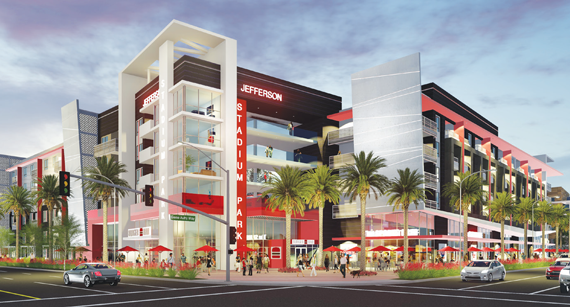
Jefferson Stadium Park
Jefferson Stadium Park
Texas-based developer JPI — whose first Platinum Triangle project, the Jefferson Platinum Triangle, is currently leasing and nearing completion — will break ground on its second Platinum Triangle project in the spring of 2017. The $225 million, 400-unit multifamily development will be sited on nearly 18 acres at 1969 East Gene Autry Way. Dubbed Jefferson Stadium Park, it is slated to open in 2018. Grand China Fund, a Beijing-based private equity real estate fund, is an investor, in a new partnership for the developer. Anaheim Mayor Tom Tait said in a statement that the development “represents the vision our city has had for Platinum Triangle, including the highest level of architectural features centered around an environment that encourages community engagement.” JPI plans to invest a total of $500 million in the neighborhood.
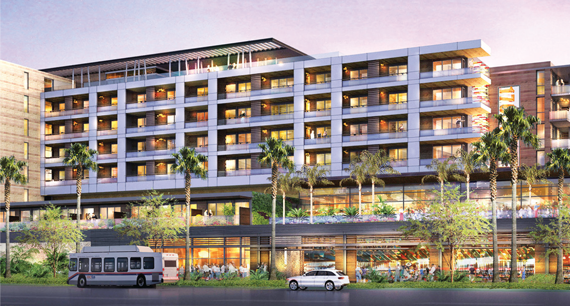
Anaheim Plaza Hotel & Suites
Anaheim Plaza Hotel & Suites
Experts say the 1960 Anaheim Plaza Hotel & Suites is a faded asset in need of an update. The owner plans to do just that using a tax incentive policy the city adopted a few years ago to encourage the building or renovation of luxury hotels. Good Hope International, an affiliate of Hong Kong-based Wincome Group, plans to spend $210 million to turn the 300-room relic, located at 1700 South Harbor Boulevard, into a 580-room luxury hotel with an as-yet-undetermined brand. “We are big believers in the Anaheim hotel and tourism market,” Paul Sanford, an asset manager for the Wincome Group, said in a statement. “With recent decisions by the City to expand the Anaheim Convention Center, and by Disneyland to invest another one billion dollars in Anaheim, it is clear that this will continue to be one of the top tourism markets in the world for decades to come.”
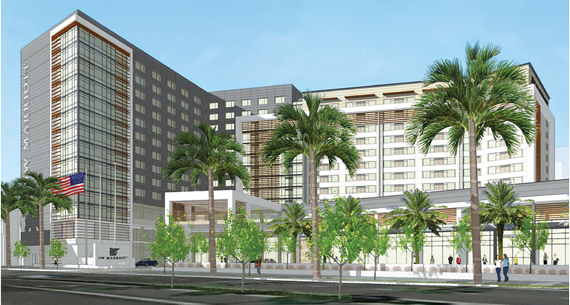
JW Marriott Hotel
JW Marriott Hotel
Plans for Anaheim’s first luxury JW Marriott hotel took a big step forward in 2013, when the City Council approved an incentive that would rebate 70 percent of hotel tax generated by the JW Marriott back to the developer for 20 years, a room-tax subsidy estimated to be worth $81.1 million. Proponents of the $200 million project say it will benefit the struggling GardenWalk shopping center, near where the 466-room hotel will be located at 1775 South Clementine Street. But opponents slapped council members with a lawsuit. An Orange County judge dismissed the suit in May 2016, and Anaheim city officials have since offered similar subsidies to other hotel developers looking to build high-end product. Bill O’Connell and Ajesh Patel, who own the land on which the hotel is to be built, have as-yet-unspecified plans to build a second luxury hotel on the site.
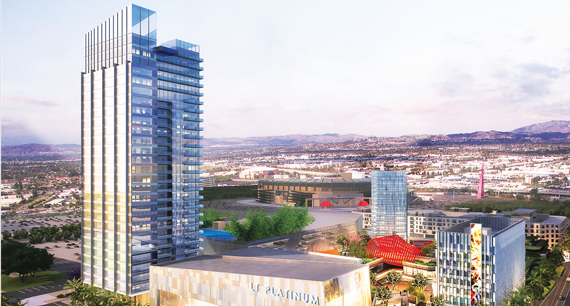
LT Platinum Center
LT Platinum Center
LT Global Investment, the American arm of Hong Kong-based LT Commercial Real Estate Limited, plans to build what would become Orange County’s tallest building. At 348 feet tall, the LT Platinum Center would surpass the 323-foot Spectrum Center tower. The $450 million, 28-story mixed-use community will include 77,000 square feet of office space, 440,000 square feet of retail, a 200-room hotel and an urban park. The 340-unit multifamily portion of the development has been significantly downscaled from its original plan when the developer acquired land at 2040 South State College Boulevard for $28.3 million in 2015. It had planned to build 405 residential units but was unable to strike a deal with the Angels to share the team’s parking lot. TRD

